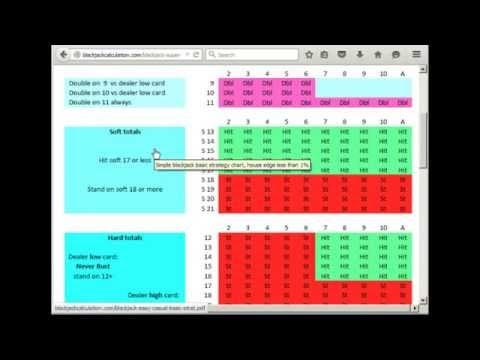Since blackjack occurs in approximately 4.8% of hands, the 1:1 game increases the house edge by 2.3%, while the 6:5 game adds 1.4% to the house edge. Video blackjack machines generally pay 1:1 payout for a blackjack. Dealer wins ties The rule that bets on tied. A six-deck game with rules that lead to a 0.6% house edge with 3-2 payoffs on blackjacks has a 2% edge if blackjacks pay 6-5 and 2.9% if they pay even money. Per 100 hands at $10 per hand, your risk would be $1,000, and if blackjacks pay 6-5, the 2% house edge would lead to average losses of $20.
Hi guys. This is Mike.
The topic of this Wizard of Odds Academy video will be on the importance of a blackjack paying 3 to 2 odds in blackjack as opposed to 6 to 5, which is a very common rule variation right now.
Here in Las Vegas
You see a lot of players playing 6 to 5 blackjack even at high amounts. Frankly, I have no idea why other than out of a ignorance of math.
I hate to have to insult your intelligence by even pointing this out, but 3 / 2 = 1.5, 6 / 5 is 1.2. The player will get 30% of a bet more with every winning blackjack if he's playing 3 to 2 blackjack as opposed to 6 to 5.
How important is that rule mathematically?
Let's see:
Let's assume six decks of cards, which is the norm, and that the player has no knowledge of any other cards in the deck. The probability that the first card the player gets is worth 10 points, is 96 / 312 because there are 96 10-point cards, 16 x 6 is 96, and 312 total cards in the shoe. 52 x 6 is 312. Assuming the player's first card is a 10-point card.
He at least has hope of a blackjack. He will need an ace or that second card. There are 24 aces in the shoe, and 311 cards left.
However...
...the player might get the ace first. It's just as likely to get the ace first in a blackjack as a blackjack, starting with a 10-point card. We multiply this by two. The probability the player gets a blackjack is equal to 4.75%. However, in order for this pay to make any difference, it must be a winning blackjack. If the dealer gets a blackjack too, then it doesn't make any difference.
Once the player has a blackjack, what is the probability that dealer will get one? Well, again, the dealer could get the ace and the 10 in either order thus the two. There will be 95 10-point cards left in the shoe out of 310 cards. After you take out the two player cards, there will be 23 aces left by the time it's the dealer's second card.
Assuming the player has a blackjack, the probability that the dealer gets one as well is 4.56%. It goes down because the player already has an ace and a 10 out of the shoe. The odds are a little bit down due to the effect of removal. The probability that the player has a winning blackjack equals 4.75% x (1 - 4.56%).
In other words, the probability of a player blackjack and times the probability that the dealer does not have a blackjack, so the probability that the player has a winning blackjack is equal to 4.53%.
The math of this is really quite easy
The probability the player has a winning blackjack is 4.53%, which is conveniently one in 21, and the game is called 21. That's easy to remember. Every time the player gets a winning blackjack, if he's playing 3 to 2 blackjack as opposed to 6 to 5, he will win 0.3 times his bet more because (3 / 2) - (6 / 5) = 0.3, as we showed before. 4.53% x 0.3 = 1.36%.
That means...


...f the player plays 6 to 5 blackjack as opposed to 3 to 2, he's giving the casino an extra 1.36% of his bet, probably for nothing. This assumes all other rules being equal.

Okay, I hope that I have convinced you guys not to play 6 to 5 blackjack when given the choice. However, if you're still on the fence, let me throw some more numbers at you.
These are all based on what are normally, otherwise, fairly standard Las Vegas Strip rules. You can find these at most of the MGM / Mirage properties. Dealer hits a soft 17, double after split allowed, player make double on any two cards, surrender is allowed, and resplitting aces is allowed. With correct basic strategy, and a blackjack paying 3 to 2, the house advantage under those rules is a nice low 0.46%.
That is giving the casino less than one in 200 hands.
It's a pretty cheap way to gamble. However, if we just change that blackjack pay from 3 to 2 to 6 to 5, then, as I just showed you, the house advantage goes up by 1.36% to 1.82%, so 0.46% to 1.82%, that is almost four times as high. That's paying four times as much for the same service and product.
Let me tell you what that looks like in terms of your expected losses per hour:
If you are a $5 player, an hour worth of play on average will cost you $1.66 at a 3 to 2 table, and $6.55 at a 6 to 5 table. A $10 player can expect to lose $3.31 per hour at a 3 to 2 table, and $13.10 at a 6 to 5 table. A $25 player can expect to lose $8.28 at a 3 to 2 table, and $32.76 at a 6 to 5 table.
Finally, a $50 player can expect to lose $16.56 at a 3 to 2 table, and $65.52 per hour at a 6 to 5 table.
I hope I've convinced you to stay away from 6 to 5 blackjack wherever you can. Now, I'm sure a lot of you are saying, 'Mike, I'm a low roller. I'm uncomfortable with the limits at the at the 3 to 2 tables.' If that's true, okay, I get it.
You may not really have the choice in that situation, and you may be stuck with 6 to 5, if you must play. Sometimes there's just nothing you can do about it and the situation is only getting worse.
The casinos here in Las Vegas as well as I think everywhere in the United States, are trying to phase out 3 to 2 blackjack slowly but surely as it's really not very profitable for them.
I don't think I have anything much more to say on this topic. Thanks for watching and I'll see you in my next Wizard of Odds Academy video. Thank you. Bye, guys.

The online JS minimizer tool helps you optimize your scripts for a better page loading speed.
US Players and Credit Card, BitCoin Deposits Accepted!
Why 6-5 Blackjack Sucks
6/5 Blackjack is a disturbing and relatively new trend in casino blackjack. 6/5 Blackjack is meant to take money out of your pocket. It's as simple as that and new blackjack players need to know the truth.
The History of 6/5 Blackjack
It was always taken for granted that a casino would pay 3-to-2 on a natural blackjack. If you drew a 21 on your first two cards, you take 50% more bet home. Players who bet $10 win $15 on a natural blackjack.
Blackjack Pays 6 To 5 Years
But in the last few years, Las Vegas casinos decided to change the old formula. Casinos set up 6/5 games, where the house pays only 6-to-5 on a natural blackjack.
So on a natural blackjack, the casino pays only $12 on a $10 bet. That becomes a huge difference in the amount of money you win in an hour's time. Changing the payoffs on blackjacks adds 1.39% to the house edge on that game of blackjack.
How did the casinos get away with this?
To walk past a 3:2 blackjack game and play 6:5 blackjack seems crazy. The answer is that casinos found a slick new way to market their new game, tricking novice players into handing over more money to the house.
Single Deck 6/5 Blackjack
Single Deck blackjack preys on the half-informed blackjack player if it only pays out at 6 to 5 for a blackjack. Almost everyone who steps into a casino knows that fewer decks mean better odds for blackjack players.
At a time, card counters began to affect the odds of blackjack by counting cards. In a one-deck game, if two Aces or seven 'ten-cards' have been dealt, then you can keep track of what's been used and bet according.
To stack the odds in their favor again, casinos began adding more decks to the game. Most casinos use either 6-decks or 8-decks per game these days. This significantly cuts down on the advantage to card counting. So players see a one-deck game advertised and think, 'Hey, I've got the odds in my favor here.'
Don't Fall For It
Most single deck blackjack games are 6/5 blackjack now. Look for the sign that says 'Blackjack pays 6/5' or something like that. If you see the 6:5 sign, walk away from the game. Whatever advantage you think you can gain from card counting, you're going to lose an automatic 1.39% from the 6/5 payouts.
Blackjack Pays 6 To 57
If you've been playing 6/5 Blackjack and just figured out the trick, then stop. Then spread the word around to family and friends to stop playing this game. Not only are your friends giving away odds at the blackjack tables, but they're going to look foolish to the other blackjack players walking by the table. And you'll look smart explaining why 6/5 Blackjack is a scam.
See also:
3 To 2 Blackjack Payouts
US Players and Credit Card, BitCoin Deposits Accepted!